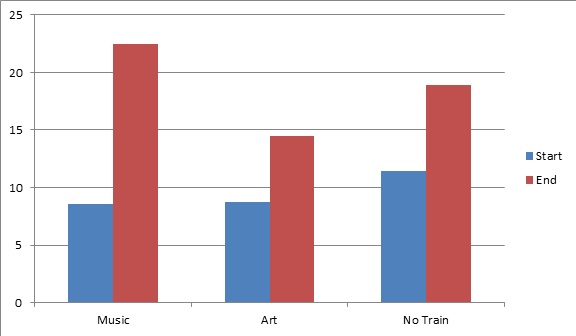?
Does music training improve other academic skills?
One sometimes hears the inclusion of music in the curriculum justified by the claim that it improves mathematics, or reading.
I?ve never cared for this justification because I think students should study music for its own sake, whether or not it boosts other skills. And it seems a chancy argument; if it turns out that music doesn?t help other academic work, does that mean it should be dumped?
Setting that argument aside, it?s certainly of interest from a cognitive point of view to know whether musical training has an impact on reading or math. There are a good number of correlational studies showing a positive effect, but few experimental data.
Now a new experimental study (Rautenberg, in press) shows that music training does have some positive effect for reading.
159 German 1st graders participated. The music training lasted 8 months and focused on three areas: rhythmic skills training, tonal/melodic skills training and auditory discrimination of timbre and sound intensity. There were two control groups: one received no training. The other was an active control receiving ?training in art.
The results were fairly robust, as shown in the graph of single word reading accuracy at the beginning and end of the year.
 What?s behind the benefit? Language does have a musical aspect to it, referred to as prosody. And indeed, children?s ability to appreciate the rhythmic aspect of speech is correlated with the ease with which they learn to read, even when controlling for phonemic awareness. In German (and in English) certain letter combinations signal certain stress patterns, so there is a signal in the written language that children can learn. The ideas is that children are less likely to learn the association of certain written letter patterns and their corresponding rhythms in speech if they don?t perceive the rhythms of speech very well.
What?s behind the benefit? Language does have a musical aspect to it, referred to as prosody. And indeed, children?s ability to appreciate the rhythmic aspect of speech is correlated with the ease with which they learn to read, even when controlling for phonemic awareness. In German (and in English) certain letter combinations signal certain stress patterns, so there is a signal in the written language that children can learn. The ideas is that children are less likely to learn the association of certain written letter patterns and their corresponding rhythms in speech if they don?t perceive the rhythms of speech very well.That?s the argument. More fine-grained analyses of the data partially support it.
The argument predicts that it?s rhythm that?s important, not tonality, and the data do show significant correlations of reading with ability in the former, but not the latter.
The argument further predicts that the training ought to reduce a particular type of error: one in which a child reads the phonetic sounds correctly but gets the rhythm wrong; they segment the word into syllables incorrectly, or they accent the wrong syllable. This prediction was not supported.
All in all, this study seems to be an important addition--although certainly not a conclusive one--to the argument that some types of music training aids children's learning to read, at least in certain languages.
Reference
Rautenberg, I. (in press). The effects of musical training on the decoding skills of German-speaking primary school children. Journal of Research in Reading.
?
Source: http://www.danielwillingham.com/1/post/2013/06/music-training-may-help-learning-to-read.html
michigan basketball ncaa final four Evil Dead halle berry kurt cobain Kamala Harris URI
No comments:
Post a Comment